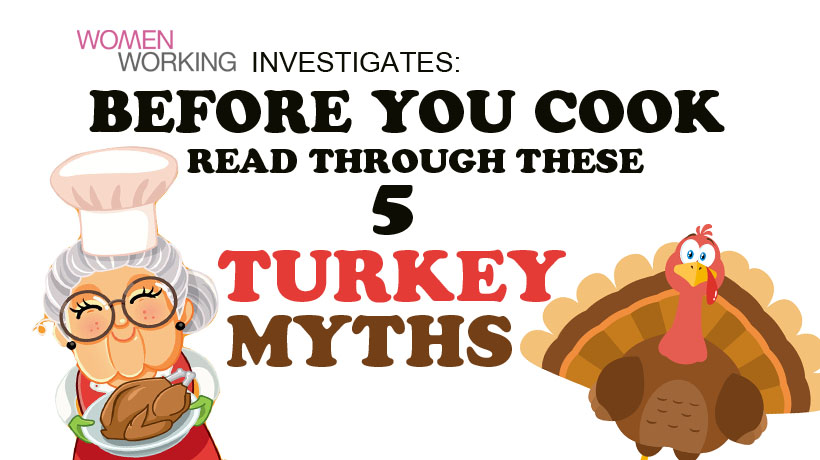Your holiday recipes for the best sweet potato casserole or most decadent turkey may come from your family. No one can make a pumpkin pie like your parents did, after all.
But despite what your grandparents have always done, your food safety tips should come from the experts. These word-of-mouth tips could be common practice around holiday time, but we’ve debunked the myths to help keep your food safe and your family healthy around the holidays this year.
Myth: Let your stuffed frozen turkey thaw before you cook it
This may be tempting to cut down on oven time, but if you have a stuffed frozen turkey, the United States Department of Agriculture (USDA) warns against letting it thaw after you’ve taken it out of the freezer, whether it’s on the table or in the refrigerator.
“The raw stuffing introduces additional bacteria,” says the USDA. “The cool temperature of the refrigerator (usually no higher than 40 °F) discourages but does not stop the growth of harmful organisms in the turkey as it thaws.”
Did you already take the turkey out of the freezer before you started reading this article? You might be able to salvage it. If there are ice crystals in the turkey and the stuffing is still frozen, it is still safe to cook, according to the USDA. The stuffing and the turkey should reach a safe minimum internal temperature of 165 degrees Fahrenheit as measured with a food thermometer.
Myth: Give your turkey a cleansing rinse before cooking
Just like you would wash your fruit before eating to minimize the risk of bacteria, you should rinse your meat too, right?
Wrong, says FoodSafety.gov, a resource site from the food regulation departments within the US government. Marianne Gravely of the USDA cites research from Drexel University that shows washing meat or poultry in water spreads bacteria throughout the countertops and other foods in the kitchen.
“Water can splash bacteria up to three feet surrounding your sink, which can lead to illnesses. We call this cross contamination,” she says. Gravely recommends moving meat straight from package to pan so that the cooking heat can kill any bacteria.
Myth: When you clear the plates, you can leave the pumpkin pie
Leaving a pie on the counter is common for anyone trying to wait for their feast to settle and make room for dessert. However, the U.S. Food and Drug Administration recommends refrigerating food within two hours to avoid bacteria growth, even including pumpkin pie.
Myth: Turkey makes you sleepy because of the tryptophan
Most people seem to only know about the amino acid “tryptophan” because of the myth that it makes you sleepy. L-Tryptophan is a building block of protein that helps make niacin, which is good for your skin and serotonin levels, according to WebMD. While turkey is a great source of tryptophan, it doesn’t make you sleepy. If you do feel drowsy after a holiday meal, it’s probably because you’ve eaten too much and your body is working harder to digest all of your food, says Dawn Jackson Blatner, an American Dietetic Association spokeswoman.
Myth: The leftovers in the fridge should give you turkey sandwiches for the next few weeks
Your office fridge might be lined with homemade turkey sandwiches for the next month, but FoodSafety.gov says turkey is only good for three or four days if you refrigerate it.
You don’t have to throw away all of your turkey in a half a week, though. FoodSafety.gov says the freezer can safely store turkey for longer periods of time.
Sources:
https://www.fsis.usda.gov/wps/portal/fsis/topics/food-safety-education/get-answers/food-safety-fact-sheets/poultry-preparation/stuffing-and-food-safety/CT_Index/!ut/p/a1/jZDBbsIwDIafhQeI7FJA44giIVqgFWKMLBcUrUmJBEmUhAF7-hW4wDS22ifL3ydbP3BgwI341LWI2hqxu8x8sMEFDpIhxbwcJmPMirdFOaUUX5b9Bnj_AyjSlv6TGuF_ft7iQNfP6bwG7kTcEm2UBVbLSIQJR-kDMGVtRYJQMp6JEh-RhK2UsVk4e9hFfybOSyf8NRNgIR6U0qZu_IrcqcDo6yYzlTzBGvjjW5g0nRXpsjfJixTL3k_gl9xuwPNg3H7FvmajCeqs8w3Zjlns/#10
https://www.foodsafety.gov/blog/2016/11/wash.html
https://www.fda.gov/ForConsumers/ConsumerUpdates/ucm092815.htm
https://www.webmd.com/food-recipes/features/the-truth-about-tryptophan#1
https://www.foodsafety.gov/keep/events/thanksgiving/index.html



